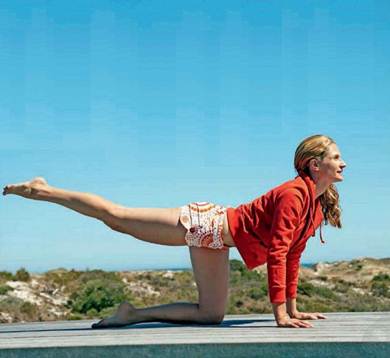Overhauling your health is best done in
small steps, but how do you know where to start? Try asking yourself one or two
of these questions each day – the answers could improve your health, fitness
and mood, or even make you live longer.
Would your great grandfather recognize everything you ate
today?
If not, chances are that unidentified item
is a processed food, “and the majority of these will either have something
added to the, or subtracted from them, which means it’s not as nutritious for
your body as it should be”, says naturopath MIM Beim. “Ideally, your diet
should be made up of foods as close to their natural form as possible – just as
your great grandparents would have eaten. After all, mother nature has been
very good at designing things that provide our body with high levels of
nutrients that work synergistically together to provide maximum health
benefits.”
Can I do this task while standing or moving?
“It’s hard with busy lives to incorporate
as much formal exercise as we need into our day, plus technology like email has
meant we’ve lost more general opportunities to move, like walking to speak to a
co-worker,” says weight-loss specialist Matt O’Neill from Metabolic Jumpstart.
This is bad news, as not only do studies
show that a high level of this non-exercise activity is one of the major
differences in lifestyle between those who are thin and those who struggle with
their weight (as every single movement you make burns kilojoules), research
also shows that the more time you spend sitting each day, the greater your risk
of heart disease and even premature death.
Experts say you need to make choices to
stand during tasks like talking on the phone or while travelling on public
transport. It might feel strange at first but, remember, it only takes 21 days
to make a new habit.
What could I do to make myself happy right now?
That’s right, now, not a week from
Wednesday after your work project is finished, or in a year after you’ve lost
6kg or got a pay rise, but within the next hour. “So many of us suffer the
‘tyranny of when’ regarding feeling good,” says Dr Timothy Sharp from The
Happiness Institute. “We say, ‘I’ll be happy when I’ve (insert goal here). The
problem is it means you miss out on feeling good each and every day.” Every so
often throughout the day, analyze if you’ve feeling as happy as you can be –
and if not, ask what it would take to change that. Ideally you would aim to
tackle the root cause of the issue rather than just munching on some chocolate
to get a sugar high. You might even find it makes those bigger goals easier to
achieve. “I believe that if you’re happier day to day, you’ll be more likely to
achieve those big goals you’re waiting for. Positive emotions lead to improved
performance, coping and resilience, and these lead to success,” says Sharp.
Is taking a over-the-counter medicine the best way to
treat this problem?
While popping the occasional painkiller for
a headache won’t hurt, if you are constantly self-medicating the same
condition, you may be better off visiting your GP, or seeing a specialist like
a physiotherapist in an attempt to tackle it at the source. For starters, you
might actually get a cure for the condition.
“Also, some serious condition can present
with seemingly innocuous symptoms – rectal bleeding, for example, which you
might treat as hemorrhoids, can be an early warning sign of rectal cancer and
should always be investigated,” says Professor Michael Kidd, GP and co-author
of Save Your Life & The Lives of Those You Love (Allen & Unwin,
$27.95).

Am I being kind if I do this?
That’s the most important question Michael
J Chase, author of Am I Being Kind (Hay House, $18.95), thinks you can ask for
your health – and the wellbeing of those around you. “Kind thoughts, words and
actions create joy, but unkindness only create suffering,” he says.
“The next time you’re about to argue,
complain, consume something unhealthy, yell at a loved one, or even litter,
pause and internally question yourself as to whether what you’re about to do is
kind for you, or someone else. If the answer is no, ask yourself “How may I be
kind?” Your job then is just to listen and follow through with the answer.” Not
only will this make your external world a better place, being kind has also
been shown to increase levels of mood-boosting serotonin and strengthen our
immune system.
Do I know how healthy I really am?
An estimated 1.8 million Australians have
high blood pressure but don’t know it, and another estimated two million women
don’t know their cholesterol level is too high. There are also 850,000
undiagnosed diabetics in the country. “Everyone should see a health
professional for a check of their overall condition at least once in their
adult life,” says anti-ageing physician Dr Michael Elstein.
Basic measurements everyone should have
checked at least once a year are blood pressure, cholesterol and blood sugar
levels, and you should keep up with any health screenings relevant to your age.
“But I’d also recommend everyone has a blood test that looks at factors like
their iron levels, thyroid hormone status and adrenal function,” says Elstein.
“It can pick up a host of undiagnosed conditions – an estimated five to 10
percent of my patients actually have a genetic condition called
hemochromatosis, which causes iron to build up in their body and triggers
issues like fatigue.”
How many times did I eat something today?
Weight-loss experts in the US have created
a machine that tracks how many bites of food people take a day – the theory has
it that each bite averages out at 105kJ and so by setting an individual a
maximum number of bites to eat you can control the kilojoules that person
consumes.
Now we’re not suggesting you go into that
much detail each day but, instead, look at the number of times you ate. “[If
you look at] between meals, snacks and picking at things as you wander past the
fridge, some people are eating 10 or more times daily,” says dietitian Susie
Burrell. A healthy regimen sees you eating three moderate meals and one to
three snacks daily, depending on your appetite. “Ideally, you should have two
to three hours at a time where you don’t eat anything,” says Burrell.

Is the exercise I’m about to do the right fit for me today
– physically and mentally?
When you are doing formal exercise, this is
key to ensure balance and results. “If you ran 10km yesterday, you shouldn’t
run it again today,” says The Biggest Loser trainer Tiffiny Hall, author of
Weightloss Warrior (Hardie Grant, $34.95). “An effective exercise regimen
includes interval drills, endurance work, strength training, core stability and
recovery. You need versatility and variety to get results, so make sure you’re
chopping and changing your routine.”
You also need to make sure you’re
exercising from the right place mentally. Hall points out many of us exercise
out of guilt or habit, forgetting that it’s supposed to be something we enjoy.
So, before you drag yourself to the gym after work when you’re tired or
stressed out, ask if your exercise is the right fit for your emotional needs
today. Sometimes it might be better to go for a swim and sauna than go for a
long run, and “occasionally having a chat to a friend would be better than
working out at all”, says Hall.
If you were diagnosed with a serious illness, but were
cured, which of your lifestyle habits would you change immediately afterwards?
“Asking this now means you might actually
avoid that health scare,” says natural health coach Mark Bunn, author of
Ancient Wisdom For Modern Health (Enlightened Health Publishing, $29.95). “Many
of the habits we’d change after a health scare like a heart attack are the ones
that caused it – so why wait? Change them now and avoid the issue. It could
save your life,” he says.